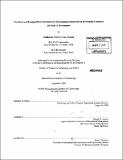The drivers of foreign direct investment in telecommunications among developing countries : the role of government
Author(s)
Cruz Alemán, Guillermo Alberto
DownloadFull printable version (5.537Mb)
Other Contributors
Massachusetts Institute of Technology. Technology and Policy Program.
Advisor
Donald R. Lessard.
Terms of use
Metadata
Show full item recordAbstract
During the late 1980s, globalization of the world's economies and technological development created the conditions for the expansion of Foreign Direct Investment (FDI) in telecommunications. This tendency has been further boosted by different economic reforms that countries have implemented, which have included the liberalization of FDI regimes and the opening of the infrastructure sectors, including telecommunications, to private investment and competition. As a result, developing countries have received considerable inflows of FDI in telecommunications through multinational companies, headquartered in developed countries that either have purchased state-owned telecom providers or have entered mobile markets. In this context, since the late 1990s a few domestic companies from emerging economies have also emerged as successful players in the international markets, generating a new wave of investment, commonly called "South-South" FDI, that currently represents nearly one-third of foreign capital inflows in telecommunications in developing economies. This thesis explores the country-level drivers of the recent wave of South-South FDI in telecommunications and how these drivers have shaped domestic companies' competitive advantages. Specifically, I address two research objectives: First, to determine what country-level factors have enabled a few domestic companies from developing countries to emerge as successful players in the international telecommunications markets. (cont.) Second, to identify the role governments have played in the rise of this type of investment. Using economic and regulatory information on 145 developing countries I built a cross-section econometric model of the determinants of this wave of FDI during the period 1998-2007. The results indicate that multinational telecommunications companies from developing economies tend to originate in relatively large countries with maturing telecommunications markets. These companies' operations tend to be located in nearby countries whose markets exhibit large potential, where they find favored access conditions and where they are able to exploit their superior knowledge of emerging markets. Also, these companies are more likely to emerge in countries that have both incorporated competitive forces and provided these companies some protection from full liberalization. In this regard, government intervention has created particular pressures, sources of advantage and business opportunities that have resulted in additional incentives for these companies' internationalization.
Description
Thesis (S.M. in Technology and Policy)--Massachusetts Institute of Technology, Engineering Systems Division, Technology and Policy Program, 2009. Cataloged from PDF version of thesis. Includes bibliographical references (p. 78-83).
Date issued
2009Department
Massachusetts Institute of Technology. Engineering Systems Division; Technology and Policy ProgramPublisher
Massachusetts Institute of Technology
Keywords
Engineering Systems Division., Technology and Policy Program.